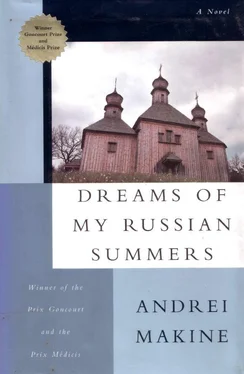"Yes. That's just the kind of French sentimentality that is choking my life!" I thought angrily.
We'd sleep together there
Till the world comes to an end…
No, I could not listen to these words anymore!
I entered the room and announced with deliberate abruptness, in Russian, "It's me! I'll bet you weren't expecting me!"
To my amazement, to my chagrin as well, the look Charlotte gave me was quite calm. I read in her eyes the faultless self-control that is acquired through coping daily with grief, anguish, danger.
Having established, via a few discreet and apparently humdrum questions, that I had not come as the bearer of bad tidings, she went to the hall and telephoned my aunt to tell her of my arrival. And once again Charlotte surprised me by the ease with which she spoke to this woman, who was so different from her. Her voice, the same voice that a moment ago had been softly crooning an old French song, took on a slightly rough accent, and in a few words she managed to explain everything, arrange everything, putting my escapade on the same level with our regular summer reunions.
"She's trying to mimic us," I thought, as I listened to her talking. "She's parodying us." Charlotte's calm and that very Russian voice only served to exacerbate my bitterness.
I began to lie in wait for each and every word. One of them was going to unleash my explosion. Charlotte would offer me her boules de neige, our favorite dessert, and then I could let fly against all her French fripperies. Or else, trying to recreate the atmosphere of our evenings together in the old days, she would start talking about her childhood, that's right, about some dog barber on a quay beside the Seine…
But Charlotte was silent. She paid very little attention to me. As if my presence had not in the least disturbed the atmosphere of one more ordinary evening in her life. From time to time she caught my eye and smiled at me, and then her face became blank again.
Our supper astonished me by its simplicity. There were no boules de neige, nor any of our childhood treats. I was amazed to realize that this black bread and weak tea was Charlotte's normal fare.
After the meal I waited for her on the balcony. The same garlands of flowers, the same endless steppe beneath the heat haze. And between two rosebushes – the face of the stone bacchante. I had a sudden impulse to hurl this head over the handrail, to snatch at the flowers, to shatter the stillness of the plain with my cry. Yes, and now Charlotte would come and sit on her little chair and spread out a piece of fabric on her lap…
She did appear, but instead of settling down on her low seat she came and leaned on the handrail beside me. This was how my sister and I used to stand in the old days, side by side, watching the steppe as it sank slowly into the night and listening to our grandmother's stories.
Yes, she rested her elbows on the cracked wood, gazing at the endless plain that was tinged with transparent violet light. And suddenly, without looking at me, she began to speak in a remote and pensive voice, which seemed to be addressing both me and someone else besides.
"You know, it's strange… A week ago I met a woman at the cemetery. Her son is buried in the same row as your grandfather. We talked about them, their deaths and the war. What else can one talk about in the presence of graves? Her son was wounded a month before the end of the war. Our soldiers were already advancing on Berlin. Every day she prayed that they would keep her son in the hospital one more week, three more days (she was a believer – or was turning into one during that waiting time)… He was killed in Berlin, during the very last of the fighting. Actually on the streets of Berlin. She told me all that very simply. Even her tears were simple as she told me how she prayed… And do you know what her story reminded me of? A wounded soldier in our hospital. He was afraid to go back to the front, and every night he reopened his wound with a sponge. I surprised him doing it and told the head doctor. We put a plaster cast on this wounded man, and some time later when his leg was healed, he went back to the front… At the time, you see, it all seemed so clear, so right. And now I feel a bit lost. Yes, my life is behind me, and suddenly everything has to be reconsidered. Perhaps it may seem silly to you, but from time to time I ask myself,'suppose I sent him to his death, that young soldier?' I tell myself that probably somewhere in the heart of Russia there was a woman who was praying every day that they would keep him in the hospital for as long as possible. Yes, like that woman at the cemetery. I don't know… I can't forget that mother's face. It's quite untrue, you see, but now it seems to me as if there was a little note of reproach in her voice. I don't know how to explain all that to myself…"
She fell silent and remained quite still for a long moment, her eyes wide open; the pupils seemed to retain the light of the sunset, now faded. Transfixed, I watched her sideways, without being able to turn my head, change the position of my arms, or relax my crossed fingers…
"I'll go and make your bed," she said finally, leaving the balcony.
I stood up and glanced around in amazement. Charlotte's little chair, the lamp with its turquoise shade, the stone bacchante with her melancholy smile, the narrow balcony poised above the nocturnal steppe – all suddenly seemed so fragile! I was bewildered to recall my desire to destroy this ephemeral setting. Now the balcony was tiny – as if I were observing it from a great distance – yes, tiny and defenseless.
The next day a dry burning wind invaded Saranza. At the corners of the streets baked hard by the sun there arose little tornadoes of dust. And their appearance was followed by an explosion of sound – a military band struck up on the central square, and the hot gusts carried snatches of their valiant uproar all the way to Charlotte's house. Then the silence abruptly returned, and one could hear the grating of sand against the windowpanes and the feverish buzzing of a fly. It was the first day of maneuvers that were taking place several kilometers away from Saranza.
We walked for a long time. First of all crossing the town, then out over the steppe. Charlotte spoke with the same calm and detached voice as the previous evening on the balcony Her story mingled with the merry tumult of the band, then suddenly the wind dropped, and her words resounded with a strange clarity in the emptiness of sun and silence.
She told of her brief stay in Moscow two years after the war… One fine afternoon in May as she was walking along the network of lanes in the Presnya district, which led down toward the Moskva River, she felt she was convalescing, recovering from the war, from fear, and even, without daring to admit it to herself, from Fyodor's death, or rather from her obsession with his absence… On the corner of a street, she heard a snatch of a remark as two women passed close by her in conversation, "Samovars…" said one of them.
"The good tea in the old days," thought Charlotte, echoing them. Then as she emerged onto the square, in front of the market, with its wooden booths, its kiosks, and its fencing of thick planks, she realized that she had been mistaken. A man without legs, installed in a kind of box on wheels, advanced toward her, his one arm outstretched.
"Now then, my lovely, spare a little ruble for the invalid."
Instinctively Charlotte turned away from him, so much did this stranger resemble a man rising from the earth. It was then she perceived that the outskirts of the market were swarming with disabled soldiers – with these "samovars." Trundling along in their boxes, some equipped with little wheels with rubber tires, some with simple ball bearings, they confronted people at the exit, asking them for money or tobacco. Some people gave, some hurried past, yet others let fly with a curse, adding in reproving tones, "The state supports you already… Shame on you!" The samovars were almost all young, several of them visibly drunk. All had piercing, slightly mad eyes… Three or four boxes came hurtling toward Charlotte. The soldiers thrust their sticks down against the trampled soil of the square, writhing as they propelled themselves along with violent convulsions of their whole bodies. Despite their pain it almost looked like a game.
Читать дальше












